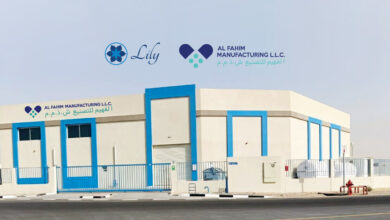The Road to Efficient, Quality Patient-Centric Care

The COVID-19 pandemic has changed many things, including the perception of healthcare among business executives. Prior to the pandemic, GE’s biennial survey on global innovation found that IT, high-tech and the internet were seen as the most innovative sectors. But in the wake of the pandemic and given the response by government ministries, private healthcare providers and others, the healthcare industry came out as the top innovator in the 2020 edition of GE’s Global Innovation Barometer.
That’s no surprise for Naël Dabbagh, General Manager for the Middle East, North East Africa, Turkey and Central Asia at GE Healthcare. Long before the pandemic struck, his vocabulary was full of terms like big data, predictive analytics, and automated, cross-network data-sharing.
That’s because pre-pandemic, the healthcare industry was already beginning to explore the world of precision health, an approach that helps clinicians and healthcare systems deliver a highly personalized approach to both patient wellness and treatment of illness. That makes it possible not only to deliver higher-quality patient-centric care, but to do so in a more efficient, timely and cost-effective manner.
Precision health combines big data analysis of millions of anonymized patient medical records with each specific patient’s genetic makeup, health history, family medical history and lifestyle choices to deliver the diagnostics, treatment and monitoring required to deliver precisely the right care at the right time to each patient.
“Covid-19 really accelerated the adoption of predictive and preventative healthcare technology,” he explains. “What would have previously taken the industry years to implement is now taking months.”
Data delivers health
The recent launch of Edison Health Services offers a good example. This platform provides an open, extendable, modern architecture for the development and deployment of AI-based digital applications in healthcare. All types of clinical, operational, and financial applications can easily be developed using these tools and securely accessed and hosted, whether in the cloud, on premises (e.g. via GE Healthcare’s Edison HealthLink appliance), or directly onto smart imaging devices like x-rays, CTs and ultrasound machines.
The potential scope for enhanced patient outcomes and operational improvements are huge, Dabbagh explains, given that the volume of medical data being generated is exploding. The average hospital is creating 50 petabytes of data each year, coming from a vast array of sources: devices, medical images, electronic medical records, operational and financial metrics and more. And yet, less than 3% of the data generated is actionable, tagged or analyzed.
To begin unlocking the potential of precision care, Dabbagh says, new AI-based tools are needed to aggregate, standardize, and quickly make sense of this information.
“The data in health systems and in the social domain, exists in disparate forms, in different locations and across different systems, leading to siloed and fragmented information,” he explains. “This makes it challenging to contextualize each individual patient’s information, as well as the horizontal knowledge base within health systems acquired over decades of work, and bring it to bear at the point of care. They try to cobble together these systems, but healthcare partners want to be able to leverage data, software and analytics across their entire business, bringing together a connected, digital enterprise.”
This is an area where the power of Edison™ Health Services can help, in part by providing developers and innovation partners a platform that Dabbagh says will speed the development and adoption of AI technology in the health arena.
Partnerships produce innovation
The recently launched EMEA Edison™ Accelerator, a start-up and healthcare provider collaboration program in Europe, the Middle East and Africa, is showing how this digital health platform can help. It brings together healthcare providers interested in being at the forefront of innovation, and start-ups who want to take their solutions forward by leveraging the GE Healthcare environment and GE mentoring.
Another regional collaboration around this digital platform is between GE Healthcare and Prof. Hakki Muammer Karakas, M.D., Istanbul Provincial Health Directorate Radiology Services Coordinator and Health Sciences University Faculty Member. The cooperation is the first in Turkey to accelerate AI development in medical imaging. Prof. Dr Karakas will lead the research and development teams comprised of distinguished clinicians, radiologists, scientists from different disciplines, senior data scientists and software developers under the newly established company CUREA, at TECHNOPOL Istanbul. Using GE Healthcare’s Edison Health Services, the teams will work to develop AI-based applications focused on the detection, categorization and severity grading of COVID-19 to diagnose and treat patients. They also will develop AI-based applications for the automatic detection and classification of breast lesions through contrast-enhanced spectral mammography (CESM).
“Over the next few years, we expect Edison™ Health Services to become central to the healthcare ecosystem and an important hub for innovation with thousands of applications and healthcare services available,” Dabbagh adds.
Security ensures privacy
Dabbagh says one of the biggest requirements to fully unlocking the possibilities of precision health is ensuring robust and reliable security and privacy across all databases and other elements of the seamless system.
“That’s why we’ve embedded security into the design of our devices and software systems,” he observes, “and were one of the first healthcare technology companies to create a set of ethics around how it will and won’t use AI in healthcare.”
Looking to the future, it’s clear that with comprehensive cybersecurity and a thoughtful regulatory framework in place, healthcare practitioners will continue to expand the possibilities of precision health.
For Dabbagh, precision health is still in its “infancy.” However, he’s excited by this moment: “while there is no shortage of projections on what a healthier world looks like thanks to more precise, predictive, prescriptive, efficient, and preventative care, we are already making tangible progress toward enabling that vision,” he says.














